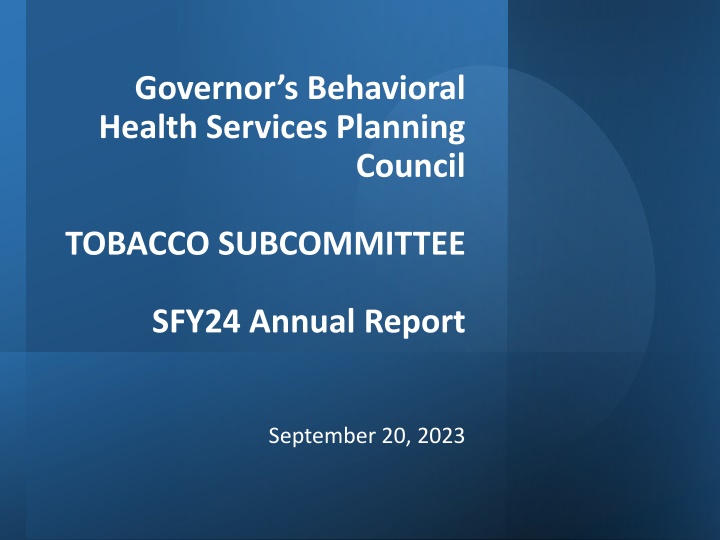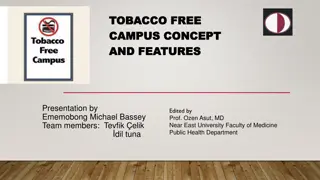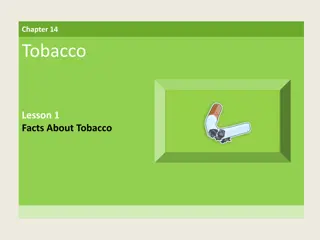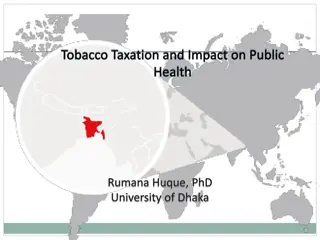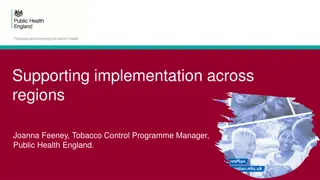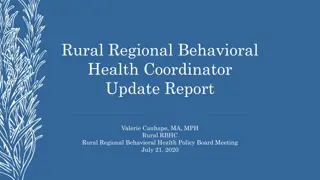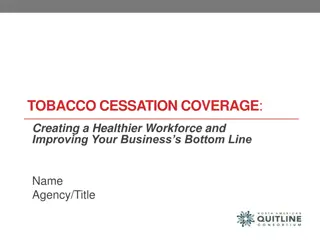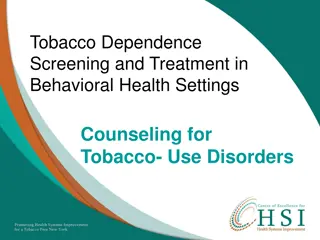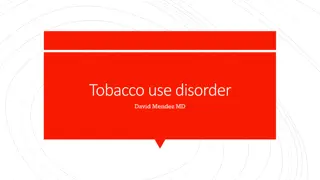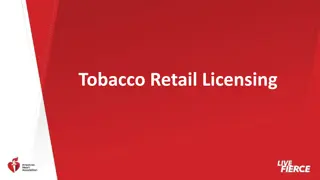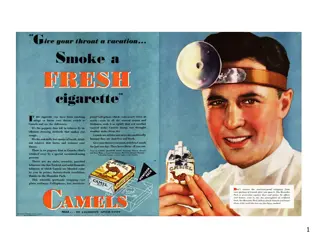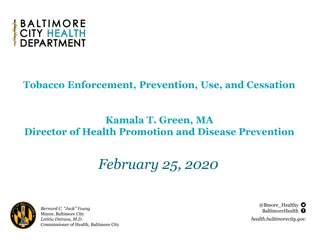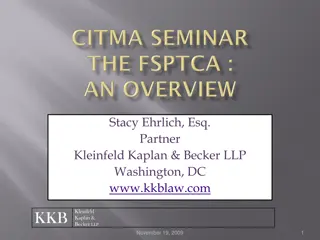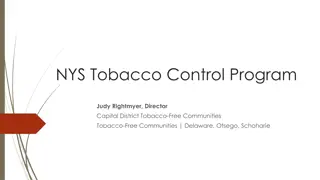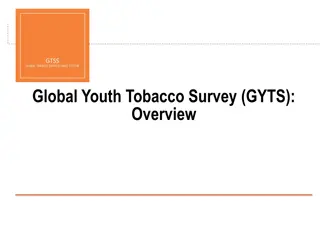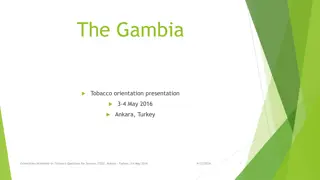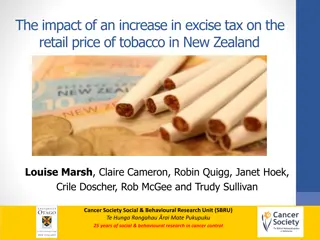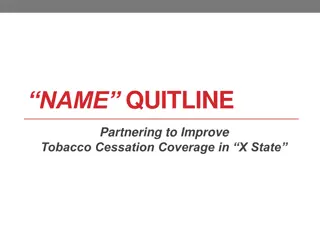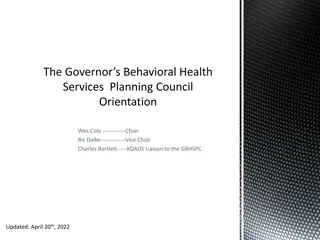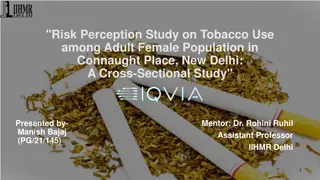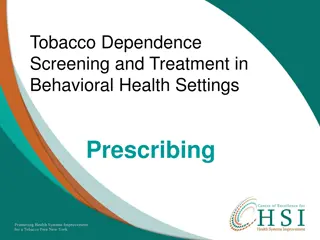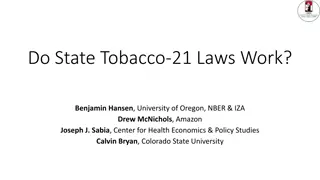Governor's Behavioral Health Services Planning Council Tobacco Subcommittee Report
Tobacco remains a significant risk factor for individuals with behavioral health conditions, with high smoking rates among this population. The Governor's Behavioral Health Services Planning Council Tobacco Subcommittee aims to promote a tobacco-free lifestyle and enhance recovery by addressing tobacco use among those with behavioral health issues. The subcommittee's membership includes diverse organizations and stakeholders collaborating to prevent and reduce tobacco use. Regular working group meetings provide a platform for engagement in tobacco cessation efforts.
Download Presentation

Please find below an Image/Link to download the presentation.
The content on the website is provided AS IS for your information and personal use only. It may not be sold, licensed, or shared on other websites without obtaining consent from the author.If you encounter any issues during the download, it is possible that the publisher has removed the file from their server.
You are allowed to download the files provided on this website for personal or commercial use, subject to the condition that they are used lawfully. All files are the property of their respective owners.
The content on the website is provided AS IS for your information and personal use only. It may not be sold, licensed, or shared on other websites without obtaining consent from the author.
E N D
Presentation Transcript
Governors Behavioral Health Services Planning Council TOBACCO SUBCOMMITTEE SFY24 Annual Report September 20, 2023
Tobacco is the leading behavioral risk factor for chronic disease morbidity and mortality. According to the CDC, people with mental illnesses and addictions comprise about 25% of the population, but they smoke almost 40% of all cigarettes produced. The Need Tobacco use also kills a disproportionate number of people with behavioral health disorders. Still, anti-smoking efforts have not been directed consistently toward people with mental illnesses in the past.
Tobacco Subcommittee VISION: A tobacco-free lifestyle, as a part of behavioral health recovery in Kansas MISSION: To sustain concerted effort at preventing and decreasing tobacco use among individuals with behavioral health conditions, while enhancing success in recovery through increased participation in cessation treatment.
MEMBERSHIP Name Representation Chad Childs; Secretary Daniel Craig; Chairperson Babalola Faseru Sara Prem Alberto Reyes Rodriguez; Vice Chairperson Matthew Schrock Dee Kinard Jamie Wallen (Non-voting) WSU Community Engagement Institute Kansas Public Health Association University of Kansas School of Medicine American Lung Association Mental Health Association of South Central Kansas Kansas Department of Health and Environment Lawrence-Douglas County Public Health Kansas Department for Aging and Disabilities (KDADS Liaison) Learning Tree Institute at Greenbush Kansas Department of Health and Environment Reno County Health Department Kansas Healthcare Collaborative Association of Community Mental Health Centers of Kansas, Inc. LiveWell Finney County Lisa Chaney Jeremy Goering Candace Davidson Kaylie Anderson Sue Murname Donna Gerstner Nicole Passafume Valeo Behavioral Health Care
The Working Groups quarterly meeting schedule is the forum for engaging stakeholders who are involved in tobacco cessation work. Behavioral Health Tobacco Working Group The Working Group list includes both passive and active participation among individuals who are part of that communications list.
Strategy Teams Ongoing work is focused through monthly meetings Some unique and some overlapping interests Tobacco Subcommittee will help with coordination and giving them access to key decision-makers in State government
Strategy Teams Data Strategy Team Education Strategy Team Policy & Systems Change Strategy Team
Charter & Expectations Up to 20 members Letter of Commitment Attend at least 75% of all meetings Passing vote: 2/3 of members are in favor. 50% of Membership is a quorum
Officers (2-year terms: Chair, Vice-Chair, Secretary) Citizen Members with lived experience (2-4 members) Tobacco Subcommittee Membership Work Groups (8 members) Goals Data Strategy Team Education Strategy Team Policy & Systems Change Strategy Team
SFY23 FOCUS and PROGRESS Subcommittee organizational resources increased House Bill 2269 passed in the 2023 session Kansas will receive nearly $10 million as part of a multistate settlement with JUUL Labs Forces JUUL to comply with terms limiting their marketing and sales practices Paid over 6 to 10 years Directed the first payment, in the amount of $938,756, to the Tobacco Use Prevention Program for FY24
Goals 1. Increase access to evidence based treatment for individuals with mental illness and substance use disorders, especially for Medicaid beneficiaries. 2. Expand insurance coverage and increase utilization of insurance for tobacco dependence treatment. 3. Create statewide policy and culture change to support tobacco prevention and treatment in substance use, mental health, and primary care settings. 4. Support behavioral health and primary care providers in adopting and implementing the Kansas Tobacco Guideline for Behavioral Health Care. 5. Increase the number of behavioral health and primary care providers who are actively engaged in providing tobacco cessation treatment. 6. Support school and youth community-based tobacco prevention programs
Barriers Barriers Getting prescriptions for tobacco cessation medication Staff turnover Limited available data specific to current goals
Tobacco Subcommittee Goal #1 SFY24 GOALS Goal #1 Gather needs and capacity assessment data to present a more accurate picture of tobacco cessation treatment, policy, and culture in Kansas Increase the number of behavioral healthcare providers who are actively engaged in providing tobacco cessation treatment Create statewide policy and culture changes to support tobacco prevention and treatment in substance misuse and mental health settings. Goal #2 Goal #3 Support school and youth community-based tobacco prevention programs Goal #4
ACTION RECOMMENDATIONS to GBHSPC & KDADS Create a private insurance mandate cover cessation prohibit tobacco surcharge Expand Kansas Tobacco Quitline referral system Expand Nicotine Replacement Therapy Offering through the Kansas Tobacco Quitline Fund a return of Kessler 6 to BRFSS Medicaid KDADS and KDHE review of KanCare eligibility
TOBACCO SUBCOMMITTEE RESOURCE REQUEST of KDADS SECRETARY RECOMMENDATION FISCAL ESTIMATE $6,000/question ($36,000 total) Tobacco Subcommittee, KDADS, and KDHE explore creating questions to be added to the 2025 BRFSS survey that would need to be submitted in July 2024 Kansas offer 8 weeks of combination Nicotine Replacement Therapy (NRT) to all enrollees. $100,000/year
Questions? 16
CONTACT US Daniel Craig, Chairperson; dacraig@srhc.com Alberto Reyes Rodriguez, Vice Chairperson; alberto.reyesrodriguez@ks.gov
